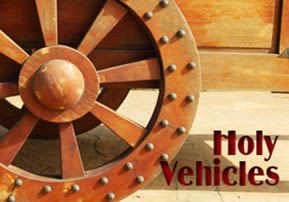
Holy Vehicles
It’s impossible to sit comfortably on the sofa with a cup of coffee and thereby "find the truth." A person has to get up, move forward, and make some real effort…

Part 7 of “The Journey,” by Erez Moshe Doron: an elaboration of Rebbe Nachman’s famous tale of “The Rabbi and the Only Son”
In the Kabbalah there is a concept called “the holy vehicle.” Opposing it is “the vehicle of the other side.” According to one way of interpretation a person’s physical body with its abilities and tendencies is a vehicle traveling to a special destination. But who is driving this vehicle?
If the “good inclination” is driving it towards the right goal and it is making spiritual progress, then it is a “holy vehicle.” It is on the journey towards the good, towards wholeness and perfection. On the other hand, if the “evil inclination” is the driver, then it is not heading towards an exalted life imbued with real values. It is driving towards the gratification of temporary desires without thought for consequences.
Then it is called the vehicle of the other side, the side opposite the holy one. It is the vehicle of the unholy side because it is heading towards a life of intellectual poverty and spiritual death.
When they harnessed the coach to travel….
A person has to understand that in order to begin to search it is impossible to sit comfortably on the sofa with a cup of coffee and thereby “to find the truth.” A person has to get up. He has to travel: i.e., to make some real efforts and steps forward. He has to make some serious preparations.
The text of the parable reads: “When they harnessed the coach….” The Hebrew word for “harness” is a cognate of the word “to prohibit.” Real spiritual growth demands responsibility. Therefore, things and activities which are prohibited or permitted necessarily come into question.
In order to journey to the true, spiritual destination, a person has to harness his vehicle. In other words, he has to discipline himself by placing limits and prohibitions upon his body and his mind.
There are other deep and hidden meanings in the Hebrew words for prohibited and permitted. One of them is the cognizance of the word “to permit” which in Hebrew also means to untie and to loosen. For example, if a person would untie one row of a straw basket, the whole thing would lose its shape and collapse. It would no longer be a basket and nothing could be put into it. It would cease to be a receptacle and it would become a shapeless mass of straw.
Conversely, a potter takes a shapeless lump of clay and while it is spinning on the wheel his hands form it into a vessel. In effect, the potter’s hands are limiting the amorphous extension and free flow outward of the clay. By placing these limits the amorphous clay takes shape and becomes a vessel.
In the same way, water has no shape but flows outward without limits until it becomes a flat puddle. Only when it is poured into a vessel does it take a shape by virtue of the limits which the receptacle places upon it.
Our culture is called permissive. It tends towards the supposition that everything is permitted. Consequently, it is becoming a shapeless mass, and it is losing its function as a receptacle for values. Values imply that some things and some forms of behavior are more valuable than others; some are better and some are worse; some are good and some are bad; some are permissible and others are prohibited. But all such distinctions disappear in the permissive society.
Although placing limits upon oneself seems arbitrary and difficult, it is actually what gives identity and distinction to a person enabling him to acquire values and fulfill them.
This important lesson can be further illustrated by an example from everyday life. A person adds a little salt to his food in order to give it taste. However, he is careful to limit this. If he adds too much salt his food would entirely lose its taste and it would become inedible. Similarly, a person achieves “taste” in life by respecting limits and prohibitions. The hero of our story who is seeking the true taste of life has to harness his vehicle and work upon his self-discipline.
The father said further, “let us make a test like this. If everything goes smoothly, then our journey is favored by heaven. But it not, then it is a sign that it is not in heaven’s favor and we will return.”
Many people invent tests and signs for themselves, even though these are quite illogical. Even in the most critical circumstances of life people use similar charms like flipping a coin, etc.
The test used in our story is interesting because it reveals a suppressed attitude of defeat and a lack of honesty. What is a person in this situation saying to himself? “I am looking for the way. If everything goes smoothly for me, then it is a sign that this is the way. If there are difficulties, then it is not for me.” Is this a logical test?
In fact, just the opposite is true. If journeying on the right way were so easy, then there would be no need for searching in the first place and we would not have to exert any effort at all. Could a person become a champion sportsman without exertion, without overcoming difficulties and without self-discipline?
A smooth way without difficulties needs to arouse suspicion. That is how we should relate to all the easy and instantaneous solutions to life’s problems. “Say a mantra and your life will turn into a serene rose garden. Kiss the charm and everything will be okay. Flow with the current. Don’t exert yourself to think about it. Be yourself. Release the pressure….” We all recognize these cheap slogans and know they don’t work so well in real life.
If a person would awaken one morning and suddenly see a tall building standing in front of his house, he would certainly understand that it is some kind of mirage or trick. It is not possible that a tall building could be set up overnight.
On the other hand, if he sees that a big building is being erected brick by brick, little by little over a long period of time, then it would be clear to him that a real building is standing in front of him.
It is exactly the same with spiritual buildings. Overnight magical solutions are definitely false. They do not exist. Only gradual and fundamental progress, exerted with thought and the investment of effort can change a person’s psyche and soul and turn him into a sort of multi-storied building of noble and good character.
However, people have been habituated to the culture of “instant.” They do not want to exert themselves; and this is the defeatist attitude expressed by the test, “If everything goes smoothly….” In all areas of life such as business or interpersonal relationships only investment bears fruit. Yet, in the realm of the spirit modern people want easy, fast solutions.
To be continued.
***
With sincere gratitude to www.levhadvarim.com













Tell us what you think!
Thank you for your comment!
It will be published after approval by the Editor.